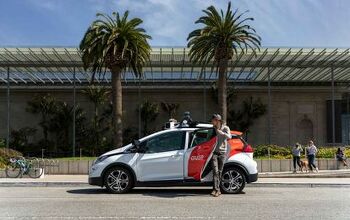Your Future No Longer Includes Rear-Ending That Other Car

As we reported yesterday, a group of top automakers has agreed to offer automatic emergency braking (AEB) on almost all of their models by 2022.
The National Highway Transportation Safety Administration (NHTSA) confirmed the voluntary agreement today, meaning virtually all light-duty cars and trucks sold in North America will adopt the safety feature by Sept. 1, 2022.
The group is made up of Audi, BMW, FCA US LLC, Ford, General Motors, Honda, Hyundai, Jaguar Land Rover, Kia, Maserati, Mazda, Mercedes-Benz, Mitsubishi Motors, Nissan, Porsche, Subaru, Tesla Motors Inc., Toyota, Volkswagen and Volvo Car USA.
“By proactively making emergency braking systems standard equipment on their vehicles, these 20 automakers will help prevent thousands of crashes and save lives,” said U.S. Transportation Secretary Anthony Foxx in a statement.
Imposing mandatory AEB through regulations would have taken an extra three years, the NHTSA estimates, during which time a total of 28,000 preventable crashes (resulting in 12,000 injuries) would occur. The NHTSA and the Insurance Institute for Highway Safety (IIHS) worked closely with the automakers to reach the agreement.
The vehicles that must comply by 2022 are cars and trucks with a gross vehicle weight of 8,500 pounds or less. Trucks with a GVW of 8,501 to 10,000 pounds will have to comply by Sept. 1, 2025.
Owning a vehicle with AEB might just save you money above and beyond the collisions the system will help you avoid.
“Deploying AEB on a wide scale will allow us to further evaluate the technology’s effectiveness and its impact on insurance losses, so that more insurers can explore offering discounts or lower premiums to consumers who choose AEB-equipped vehicles,” stated IIHS Board Chairman (and CEO of American Family Insurance) Jack Salzwedel.
Taking full advantage of the announcement, Volvo released a statement today reminding everyone that automatic braking has been standard on its full line of vehicles since 2014. Volvo claims the technology has reduced rear-end collisions by 41 percent and injures to occupants by 47 percent.
[Image: Mark Turnauckas/ Flickr]

More by Steph Willems
Latest Car Reviews
Read moreLatest Product Reviews
Read moreRecent Comments
- Probert They already have hybrids, but these won't ever be them as they are built on the modular E-GMP skateboard.
- Justin You guys still looking for that sportbak? I just saw one on the Facebook marketplace in Arizona
- 28-Cars-Later I cannot remember what happens now, but there are whiteblocks in this period which develop a "tick" like sound which indicates they are toast (maybe head gasket?). Ten or so years ago I looked at an '03 or '04 S60 (I forget why) and I brought my Volvo indy along to tell me if it was worth my time - it ticked and that's when I learned this. This XC90 is probably worth about $300 as it sits, not kidding, and it will cost you conservatively $2500 for an engine swap (all the ones I see on car-part.com have north of 130K miles starting at $1,100 and that's not including freight to a shop, shop labor, other internals to do such as timing belt while engine out etc).
- 28-Cars-Later Ford reported it lost $132,000 for each of its 10,000 electric vehicles sold in the first quarter of 2024, according to CNN. The sales were down 20 percent from the first quarter of 2023 and would “drag down earnings for the company overall.”The losses include “hundreds of millions being spent on research and development of the next generation of EVs for Ford. Those investments are years away from paying off.” [if they ever are recouped] Ford is the only major carmaker breaking out EV numbers by themselves. But other marques likely suffer similar losses. https://www.zerohedge.com/political/fords-120000-loss-vehicle-shows-california-ev-goals-are-impossible Given these facts, how did Tesla ever produce anything in volume let alone profit?
- AZFelix Let's forego all of this dilly-dallying with autonomous cars and cut right to the chase and the only real solution.


































Comments
Join the conversation
This will more than likely go the Takata route, everyone will source from the cheapest third world source, drivers will tailgate and crash, and we'll have a massive recall. Why not just drive better?
I am just waiting for the unintended consequences. While an undoubtedly good idea, now well does is it going to work in practice ?? I know my 2015 Accord is constantly warning me to brake when I am passing cars or changing lanes or even closing on someone in a rapid manner. What is going to happen when I do this with one of these system active? What happens when every 3rd or 4th car has these systems and they all suddenly (and unpredictably) brake ? I can smell the lawyer commercials already.